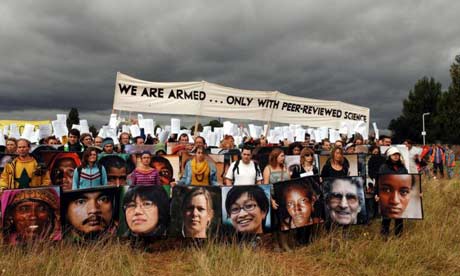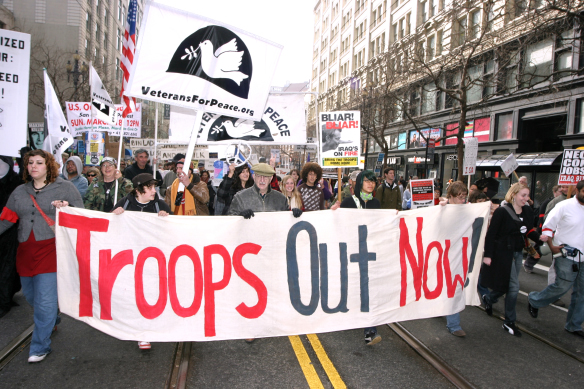 Report by Joe Redmond, Cardiff RESPECT member (Adamsdown Branch) and Unison Workplace Environmental Representative.
Report by Joe Redmond, Cardiff RESPECT member (Adamsdown Branch) and Unison Workplace Environmental Representative.Contrary to press scare stories about environmental extremists threatening to cause mass disruption to Europe’s busiest airport on a weekend in August, the 1,500 people deposited on an overgrown “sports field” adjacent to Heathrow’s northern runway had united to draw attention to government’s continued hypocrisy on the issues surrounding climate change and it’s reluctance to impose restrictions on the aviation industry.
While mainstream politicians pay lip service to tackling CO2 emissions, people from all walks of life, including myself, arrived at the climate camp to register their disgust, to meet with like-minded individuals and talk with local people whose lifelong homes were to be destroyed by the planned third runway that would double the amount of already suffocating air traffic overhead.
Police presence was ridiculously overwhelming; officers outnumbered climate campers two to one and BAA – the company which owns and runs Heathrow – roped in extra security staff, fearful of the day of mass protest planned for Sunday 21st August.
Following the embarrassing failure of BAA to secure a wide-ranging injunction to stop the camp taking place, police were authorised to invoke terror laws to stop and search, detain without charge and film campers from the ground and by helicopter above.
If the aim was to discredit eco-protestors as a bunch of cranks and anarchists it was spectacularly unsuccessful, with mainstream media giving the event acres of coverage denied to much larger recent protests such as the 100,000 strong London march against renewing the Trident nuclear “defence” system. Discussions on the issues surrounding climate change were once again on the front page of national newspapers as well as being the lead story on evening news bulletins.
Villagers from nearby Sipson, which would be levelled to make room for the new runway, visited the camp throughout the week to show their appreciation and support bringing fresh local produce, homemade samosas and flasks of coffee.
Local residents joined men, women and children from the camp on a march towards Harmondsworth, which will also be decimated by Heathrow’s planned expansion until we were circled by a ring of police in riot vans determined not to let us reach our destination – a rally in a garden centre at which local MP John McDonnell was due to speak. Armed with drums, guitars and an accordion we kept our spirits up by singing for over an hour.
A group of activists set up camp overnight on the tarmac outside BAA’s offices and Monday morning workers were told to go home by bosses who were unable to get through the blockade. Recruiters scoured the main camp in the early hours of the morning for reinforcements and some of those who had been woken up by the first roar of jet engines at 5a.m. were compelled to join in.
The camp communications tent offered text message updates on the movement of police and protesters, working overtime to inform us that two teenage girls had climbed to the roof of BAA’s offices and unfurled a banner saying “Make Planes History”, or that a group of people had chained themselves to the cargo terminal used for holding foods imported by UK supermarkets. Hilariously, one message told how a riderless police horse had been sighted circling a field next to the camp, pursued breathlessly by a horseless police officer.
During the week leading up to the day of action such luminaries as Mark Lynas and George Monbiot delivered lectures and workshops on the worsening climate crisis and the need to build a society less reliant on the unstable petrocarbon-economy. Comedian Rob Newman, who performed on Saturday evening, deemed the event “an historic occasion” and the rapturous applause gained by his comments showed we were determined to take our experiences away and continue to build local campaigns and make our voices heard.
Cardiff RESPECT calls for
* Unilateral reduction of CO2 emissions in the UK of 90% by 2030, with similar reductions in other developed countries. We demand that the Welsh Assembly set binding annual targets to cut emissions. We call for an international treaty that goes way beyond Kyoto to cap global carbon emissions.
* International rationing of air-travel. Halt airport expansion, restrict binge flying. Nationalise the airlines. We oppose the expansion of Cardiff Airport and opening of an Anglesey/Cardiff air-route. End the £9 billion tax break to the aviation industry and spend the money on more sustainable forms of public transport.
* Stop car-mageddon: Free, or cheap, integrated publicly owned transport systems. End New Labour's road building programme and spend the £30 billion on public transport. Nationalisation of rail, road freight and bus companies.
* Cancel all third-world debt. There is no point calling on impoverished countries to tackle climate change if they are saddled with debt.
* Massive investment in renewable energy. Keep Wales nuclear free. We oppose the building of new nuclear power plants in Wales supported by the leader's of both New Labour and Plaid Cymru.
* Scrap weapons of mass destruction and use the resources for sustainable development and renewable energy.
*End the productivist throwaway society: production for use not profit.
* Sustainable town planning: redesigned cities to eliminate unnecessary journeys and conserve energy.
* All new buildings to be zero-carbon; provide insulation, energy conservation etc. to all homes to make them energy efficient and therefore lower fuel bills for working class people. We call for sustanable council housing in Wales
.* Localised food production and opposition to "Supermarket Britain".
* No GM crops for food or fuel.
* No to incinerators. High quality facilities to maximise recycling. The aim should be the full recycling of waste. We oppose the LibDems plans for a Cardiff incinerator. In Neath, Respect activists launched the Crymlyn Burrows Stop the Incinerator Campaign
.* End the destruction of the rainforests.
* Defend the rights of climate change refugees and migrants. Protect those hit by drought, desertification, floods, crop failure and extreme weather conditions.
* Renationalise water and protect water reserves. End the pollution of the rivers and water ways.
*End the productivist throwaway society: production for use not profit.
* Sustainable town planning: redesigned cities to eliminate unnecessary journeys and conserve energy.
* All new buildings to be zero-carbon; provide insulation, energy conservation etc. to all homes to make them energy efficient and therefore lower fuel bills for working class people. We call for sustanable council housing in Wales
.* Localised food production and opposition to "Supermarket Britain".
* No GM crops for food or fuel.
* No to incinerators. High quality facilities to maximise recycling. The aim should be the full recycling of waste. We oppose the LibDems plans for a Cardiff incinerator. In Neath, Respect activists launched the Crymlyn Burrows Stop the Incinerator Campaign
.* End the destruction of the rainforests.
* Defend the rights of climate change refugees and migrants. Protect those hit by drought, desertification, floods, crop failure and extreme weather conditions.
* Renationalise water and protect water reserves. End the pollution of the rivers and water ways.















1 comment:
Respect (-able C) I agree with much of the 'calls' you've listed but it doesn't deal with the real issue on poverty and impoverishment here on the ground in Wales.
Yes to - ending 'the productivist throwaway society' and towards 'production for use not profit'.
Yes to * Sustainable town planning: redesigned cities to eliminate unnecessary journeys and conserve energy.
Yes, yes, yes, to: * All new buildings to be zero-carbon; provide insulation, energy conservation etc. to all homes to make them energy efficient and therefore lower fuel bills for working class people. We call for sustanable council housing in Wales
Yes to 'Localised food production and opposition to "Supermarket Britain".
But we need to go much, much, further.
The one thing we have vast amounts of in Wales is - land.
Land, and energy (in terms of people and their trapped and frustrated energy in being one of the poorest parts of Europe). We have proven low-cost, low-impact, zero carbon designs for very inexpensive housing. What we need is very clear thinking backed by policy commitments to bring those things together in a low-economic-impact framework which will allow our young and everyone else the dignity of building and owning their own homes, creating their own work, on land they are nurturing/developing, with produce and products as close to local communities as possible. Nutty dream-thinking. Wait and watch. The cost of fuel [and the ill-will Blair and Bush have provoked] will force us to find local solutions.
The Assembly is playing at it with eyes closed. Westminster is utterly wedded to international (not local) market forcing. The answer lies in people being encouraged to develop small(ish) plots in a contract which means thay put the fruits of what they produce in to collective use and wealth.
Those who oppose this will look out (in five to ten years time) from their deeply inefficient, shivering, piles and wonder how - as a society - we became so divided and impoverished by our over dependency on property 'values' and oil.
Post a Comment